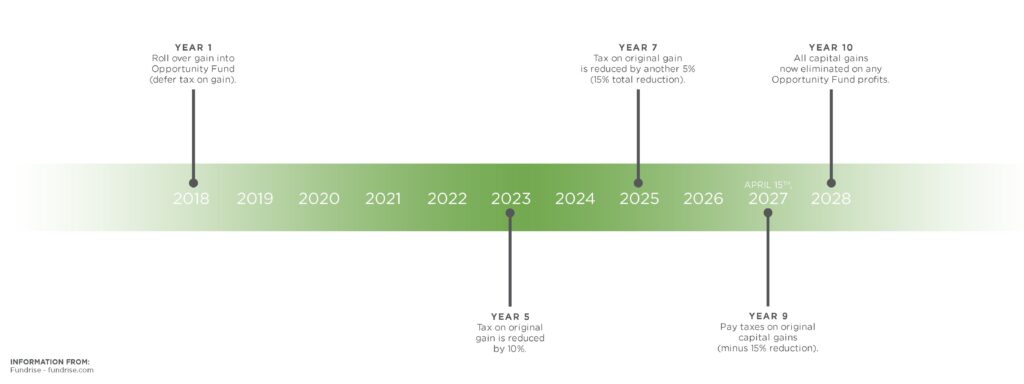Investing in real estate continues to provide tax advantages over many other alternative forms of investment. The newly passed Tax Cuts and Jobs Act of December 2017 has created another form of tax advantaged real estate investment by creating a new section of the tax code. This change provides tax incentives for investments in targeted areas, called Opportunity Zones, through investment vehicles called Opportunity Funds. By investing in an Opportunity Fund, investors have the ability to defer and reduce their existing capital gains tax liability, but can also eliminate future capital gains tax of returns earned in the Opportunity Fund.
What is an Opportunity Zone?
The targeted areas for investment are Opportunity Zones, which are areas nominated by a State or the U.S. Department of Treasury to spur economic development in low income census tracts. The Governor of each state submitted candidates for Opportunity Zone investment by April, 20 2018. Each state can nominate up to 25% of low income census tracts in the State. North Carolina has 252 approved Opportunity Zone census tracts. The list of Opportunity Zones in North Carolina can be found on the Department of Commerce website.
“By investing in an Opportunity Fund, investors have the ability to defer and reduce their existing capital gains tax liability, but can also eliminate future capital gains tax of returns earned in the Opportunity Fund.”
What is an Opportunity Fund?
An Opportunity fund is an investment vehicle that invests at least 90% of their capital in an Opportunity Zone and Opportunity Zone Properties. The fund can be created by the investor and can take the form of a partnership, a corporation or an LLC. It is important to work with an attorney to make certain the formation agreement of the fund has the appropriate language to be treated as a Qualified Opportunity Fund.
What is an Opportunity Zone Property?
An Opportunity Zone Property can be a property that is used in a trade or business, located in an Opportunity Zone. Properties qualify if acquired after December 31, 2017.
Benefits of Opportunity Fund Investment
There are three substantial tax benefits to investors participating in an Opportunity Fund:
- It allows for the tax deferral of capital gains for funds that are rolled over into an Opportunity Fund. The deferred gain would be recognized on either December 31, 2026 or the date on which the investment in the fund is sold, whichever is earlier.
- It allows for the reduction of the realized capital gain tax by creating a step-up basis for the capital gains rolled into the Fund. The basis is increased by 10% if the investment is held for at least 5 years, and by an additional 5% if held for at least 7 years. If the investment is held in an Opportunity Fund for 7 years then the tax on the initially deferred gain is expected to be reduced by 15% total.
- It allows for no tax on any capital gains from an investment in the Fund if the investment is held in the Fund for 10 years. After 10 years, the basis of the Opportunity Property shall be equal to the fair market value of the property when it is sold or exchanged. This means that after 10 years there would be zero federal capital gains tax on profits from the sale of an investment in an Opportunity Fund.
To capture these benefits offered by an Opportunity Fund, an investor must invest the gains from the sale of a prior investment (e.g., real estate, stock, bonds, a company) into an Opportunity Fund with 180 days of its sale. The investor only has to roll in the gains or profits from the sale of the investment, not the original principal. Only the taxable gains rolled over into an Opportunity Fund are eligible to receive the tax benefits.
Timeline of Investing in an Opportunity Fund

Opportunity Funds are a great new investment vehicle for those seeking tax benefits. Reach out to a broker today to see if this strategy makes sense for your investment portfolio!
